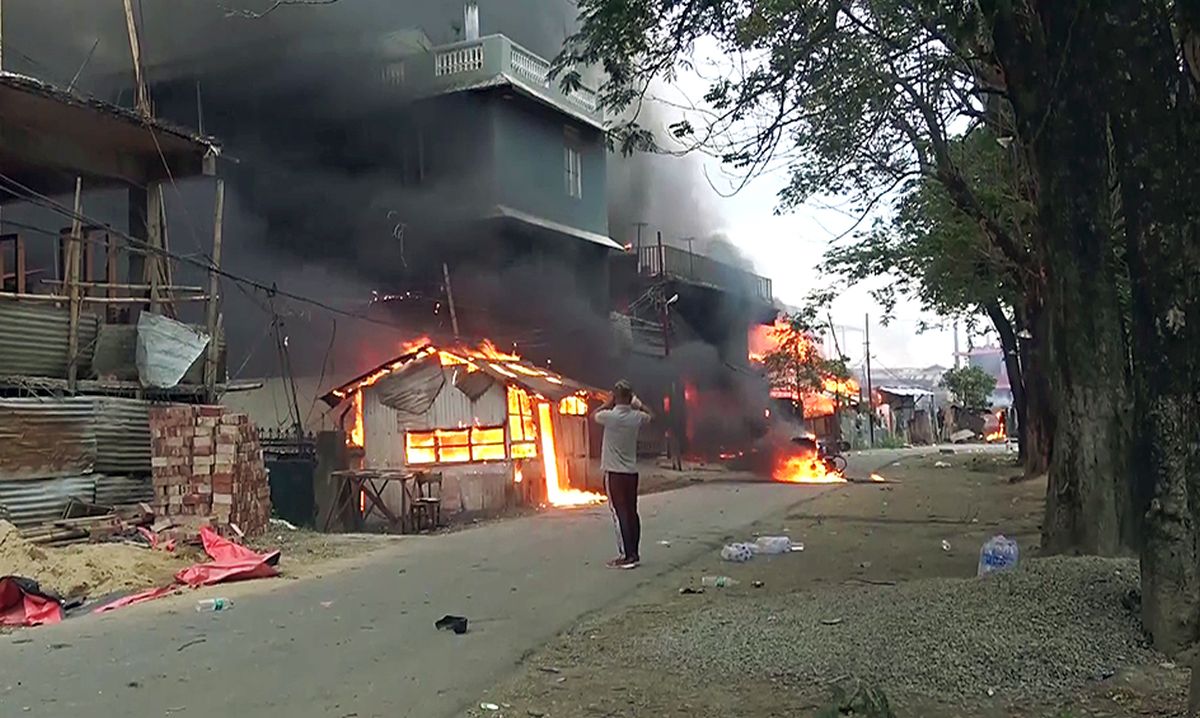A prominent local non-profit has issued a warning, stating that the ongoing civil conflict in Manipur, a border state in India, is posing a significant threat to food security in the region. The organization has called for an urgent resolution of the dispute to address the issue.
The Irabot Foundation Manipur has expressed concerns about the situation in the northeastern state, where unprovoked attacks on farmers have potentially resulted in the loss of rice plantation on over 10,000 hectares of agricultural land this season. The foundation urges the government to take urgent action and emphasizes the gravity of the situation. Gopen Luwang, the president of the organization, highlights that approximately 100,000 individuals may face inadequate access to rice, which could lead to widespread starvation in the region in the coming years.
For the past two months, Manipur has been gripped by an unprecedented wave of violence. The clashes between the largely Hindu Meitei community, representing slightly over half of the state’s population, and the Kuki tribal group, mainly comprising Christians and accounting for 16 percent of the population, have caused over 100 deaths and displaced around 40,000 individuals.

The clashes originated in May when the All Tribal Students’ Union of Manipur called for a “Tribal Solidarity March.” The march aimed to protest against the demand to include the majority Meitei community in the Scheduled Tribe (ST) category, following a directive from the Manipur High Court on April 19.
As per Indian law, the ST category provides reserved seats in government jobs, college admissions, and electoral seats, from village councils to parliament, to address historical structural inequality and discrimination.
The Kuki community opposes the inclusion of the Meitei community in the Scheduled Tribe list, fearing potential loss of opportunities and jobs due to the Meiteis’ demographic and political advantages. The Kuki tribal group also expresses concerns that extending affirmative action to the Meiteis could further strengthen their economic dominance and potentially lead to land takeovers in tribal areas.
Furthermore, Mr. Luwang highlights that farmers in the region have been unable to cultivate rice and vegetables due to unprovoked attacks by unidentified individuals. He states that approximately 40,000 metric tonnes of rice would be in deficit next year, depriving around 100,000 people of a sufficient share of rice. This alarming situation underscores the urgent need for the government to take swift action to prevent famine in Manipur, as reported by the local daily Imphal Free Press.
On Monday, the Supreme Court of India instructed the Manipur state government to provide an updated status report on the ethnic violence prevailing in the region. Tushar Mehta, the solicitor general of India, informed the court that the situation was improving, albeit slowly.
Earlier, Colin Gonsalves, a senior advocate representing the Manipur Tribal Forum, informed the court that the situation in the region had worsened, with the number of killings rising from 20 to 110.
The Manipur Tribal Forum had filed a petition in the Supreme Court, seeking the protection of the Kuki community by the Indian army.
The chief minister of the neighboring state of Mizoram also issued a statement acknowledging that the situation in Manipur had worsened.
In a tweet at 3:30 am on July 4th, 2023, Chief Minister Zoramthanga expressed his disappointment over the lack of change in the situation, stating that it had been 62 days. He questioned when the violence would cease and requested the federal government’s assistance in rehabilitating the 12,000 people displaced from Manipur to Mizoram.
Earlier, Rahul Gandhi, the leader of the opposition in India, visited Manipur by helicopter and met with individuals affected by the ethnic violence at relief camps. He raised concerns about the scarcity of medicines, food, and basic amenities in the camps, urging the government to take action.
Despite several rounds of unsuccessful peace talks, sporadic incidents of violence and arson persist, exacerbating the crisis in Manipur, governed by Prime Minister Narendra Modi’s Bharatiya Janata Party. The federal home minister, Amit Shah, visited the state earlier in the month and engaged with community leaders in an effort to restore peace.
Meanwhile, the opposition has repeatedly criticized the prime minister for his “stoic silence” on the matter, while calling for the resignation of Manipur’s Chief Minister N. Biren Singh.
